Last Updated on February 11, 2026

Estimated reading time: 9 minutes
By Kim Watkins
By definition, my daughter, Megan, and I are hodophiles — ones who love to travel — and we decided it was time to add Kenya to our passports. For this mother/daughter trip, we began our safari adventure in Nairobi, spending a few days in the city before heading out on safari. During those few days we decided to start our adventure with a Nairobi city safari.
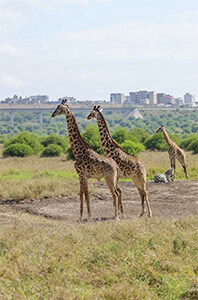
I wasn’t quite sure what to expect, but Nairobi immediately surprised me with its contrasts—chaotic traffic in some areas, yet peaceful, leafy suburbs in others. With no traffic lights anywhere, driving here is quite the experience and not something I would suggest.
Luckily, we stayed in Karen, an upscale suburb where diplomats live behind tall hedges and gated driveways. It was a beautiful, quiet base, though Nairobi isn’t particularly walkable, so taxis and Ubers are a good option. They are also remarkably inexpensive—our 45-minute ride cost just $9 USD.
For our Nairobi city safari we checked into the Tamarind Tree Hotel, a comfortable 4-star property. We chose it because of its convenient location across from Wilson Airport, the departure point for many safari flights. I usually push through jet lag after an overnight flight, but this time sleep won. After we arrived, I quickly collapsed into bed for a much-needed three-hour nap.
Table of contents

Exploring On Our Nairobi City Safari
Over the next few days of our Nairobi safari, Megan and I explored the city with our private driver, Richard. He not only navigated Nairobi with ease but also shared stories about his home and culture, giving us a richer perspective on the city.
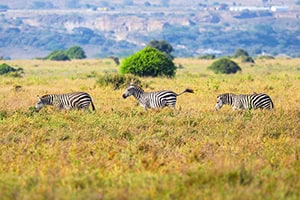
One of our most memorable visits was to the Sheldrick Wildlife Trust, where orphaned elephants and a few rhinos are rescued, rehabilitated, and eventually returned to the wild in protected areas.
At 11 a.m. each day, visitors can watch the keepers feed the young animals, and it’s pure joy watching the elephants charge toward their bottles, sometimes grabbing them right out of the keepers’ hands.
You can enjoy wonderful experiences in Nairobi with popular and highly rated Viator, a Tripadvisor company. We’re big fans of their tours, since they’re available across all price categories, have no cancellation fees, and offer a lifetime of memories. See for yourself.
Covered in mud, wrestling, and playfully slinging their trunks, they were endlessly entertaining. If you go, I suggest standing along the far-left railing where many of the elephants enter. From there we were able to gently touch a few as they wandered past. It’s also the safest spot if you’d rather not be splattered by their enthusiastic mud baths.
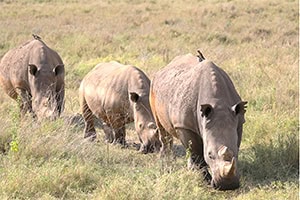
Two of the orphans stole our heart. One was Raha, a young black rhino recovering from a jackal attack. The other was mischievous Pardamat, who reminded us of our dog back home. We were so smitten that we officially adopted them, which means we donated and now receive monthly updates on our “babies.”
Although entry to Sheldrick is currently about $20 per person, the orphanage is located within Nairobi National Park. Since entrance to the park entails a gate fee, it adds $80 or more per person to the total cost. After visiting the pachyderms, we enjoyed lunch at the Karen Blixen Coffee Garden, sitting in high-back rattan chairs while dining under a canopy of trees. Overflowing ferns and tall hedges surround this farm-to-table restaurant, and it felt like we had just stepped into a secret garden.
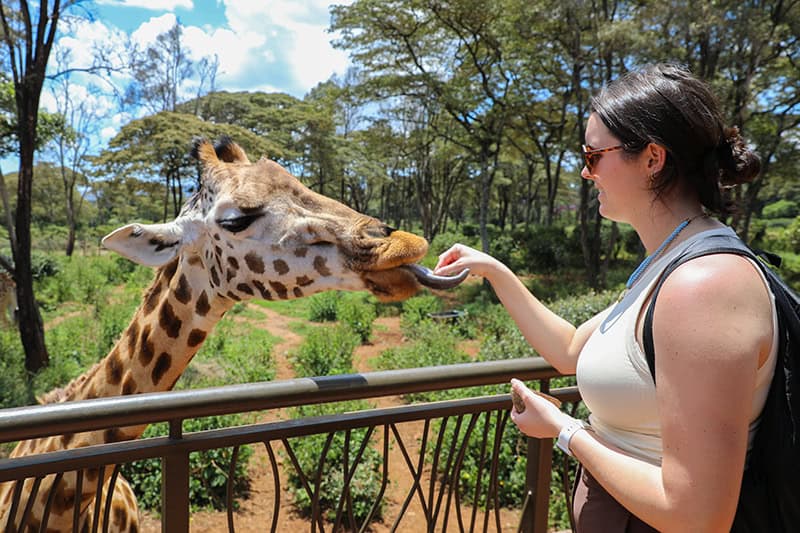
The Giraffe Centre
Later that day, we visited the Giraffe Centre, home to endangered Rothschild’s giraffes, a must-see on any Nairobi city safari. From a platform, we stood eye to eye with these gentle giants as handlers spoke about conservation efforts to increase their numbers in the wild. We were able to feed them, and Megan fell in love with a five-month-old calf with impossibly long eyelashes. If you’ve heard of Giraffe Manor, these are the very same giraffes, as the center sits on the manor grounds.
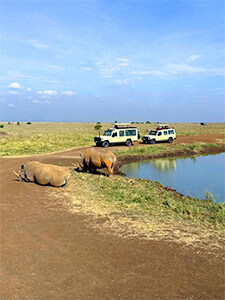
If you have a bit of extra time in Nairobi—or if you won’t be heading out on a full safari—a game drive in Nairobi National Park is a fantastic way to experience Kenya’s wildlife right in the center of the city.
The park offers a surreal backdrop with lions, rhinos, and zebras roaming with the city skyline in the distance. We spotted giraffes by the dozens, a pod of hippos, herds of zebras, and several families of black rhinos. One of the latter strolled right past our jeep on the way to a watering hole.
Watching giraffes “neck” in a courtship dance and seeing a baby zebra sprint across the grass felt like scenes from a wildlife documentary. You won’t find elephants here, since the park is simply too small for them to roam. Keep in mind that entry into Nairobi National Park requires a separate park fee, so it’s often worth pairing your visit to the Sheldrick Wildlife Trust with a game drive on the same day. Since both experiences require the same park fees, combining them can make the most of both your time and budget.
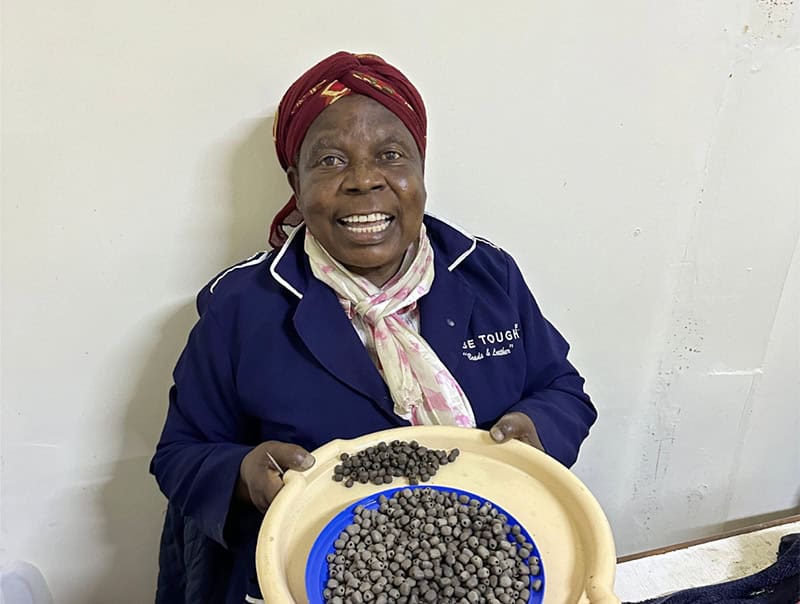
Exploring Nairobi’s Cultural Side On Our Nairobi City Safari
Beyond wildlife, on our city safari we also explored Nairobi’s cultural side. At Kobe Tough, a social enterprise for Maasai women, we learned how climate change has devastated their traditional livelihoods. Thankfully their intricate beadwork has become both a source of income and a path to empowerment.
KOBE is the Swahili term for the African Sea Turtle, a beautiful creature known for it distinctive shell. It’s believed that Kobe symbolizes the remarkable beauty and enduring strength of the African savannah.
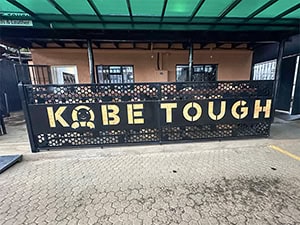
Many of the Kobe artisans are single mothers and their enterprise helps fund their children’s education. Their craft also helps preserve their Maasai heritage through beautifully crafted Apple Watch bands, jewelry, and other modern accessories.
Naturally, Megan and I filled our baskets with these beaded creations. As a Florida Gators fan, I scooped up orange and blue items perfect for future game days. In true mother-daughter fashion, Megan’s collection overflowed with red and black items, in honor of her alma mater, the University of Georgia.
That evening, we dined at Cultiva Farm, a creative farm-to-table restaurant set inside its own gardens. It’s a popular hot spot for the affluent locals to dine and socialize. We shared a creamy burrata just beneath twinkling lights, the perfect setting for a bit of people-watching. Then came an indulgent spread of tender wagyu sliders and flavorful fish tacos. The combination of delicious food and great ambience made for a grand finale to a day already filled with unforgettable experiences. It was the perfect meal before we left Nairobi and set off south to Amboseli National Park the next morning.
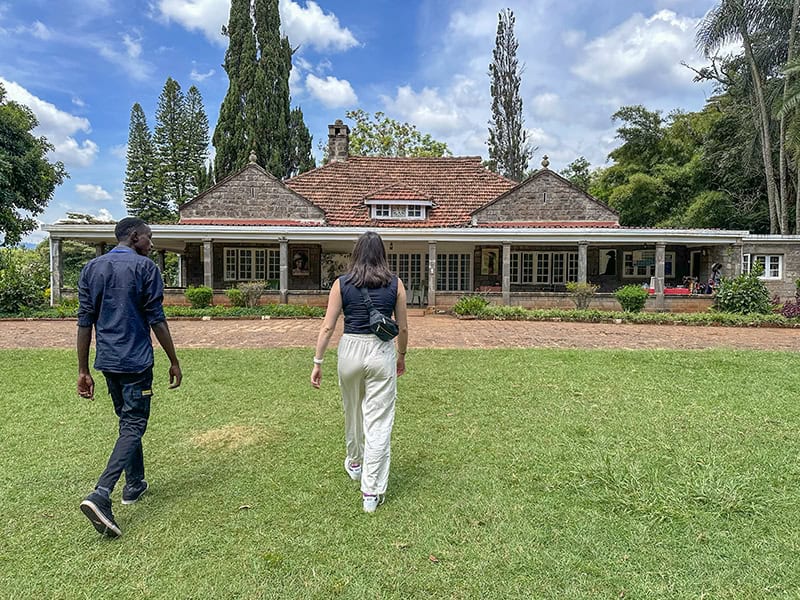
An ”Out of Africa” Experience
After ten days of safari out in the bush, we returned to Nairobi to enjoy our city safari for one last night, this time staying at the Karen Blixen Coffee Garden and Cottages. Our cozy one-bedroom cottage, with its crackling fireplace and oversized bathroom, was the ideal place to unwind.
With our driver Sammy, we visited the Karen Blixen Museum, the author’s former home at the base of the Ngong Hills. Touring the house where Out of Africa was written felt like stepping into history. I only wish we had watched the film or read the book before arriving, which would have made the experience even more poignant. Megan and I vowed to watch the movie together when we got home.
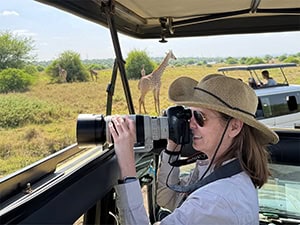
We ended our trip with dinner at Talisman, a Nairobi favorite known for its eclectic atmosphere of colonial-style charm, contemporary African art, and lush greenery. After splitting an heirloom tomato caprese (we can never resist), Megan savored salmon nigiri while I enjoyed a flavorful burger. The meal was perfectly accompanied by my new favorite drink, the refreshing Dawa—vodka, honey, lime, and soda water.
Nairobi turned out to be so much more than just a city gateway to safari. It’s a city where wildlife, history, and culture come together. And it offers travelers experiences that are both surprising and unforgettable—an ideal beginning and ending to a Kenyan adventure. Flying to Nairobi can be fairly easy from the U.S., as there is a nonstop flight from New York’s JFK on Kenya Airways. After this 14-hour flight, you’ll be hearing “Jambo!”, the Swahili term for hello.
Then, very likely too soon, you’ll be hearing “Kwaheri!” (goodbye).

Leave a Reply